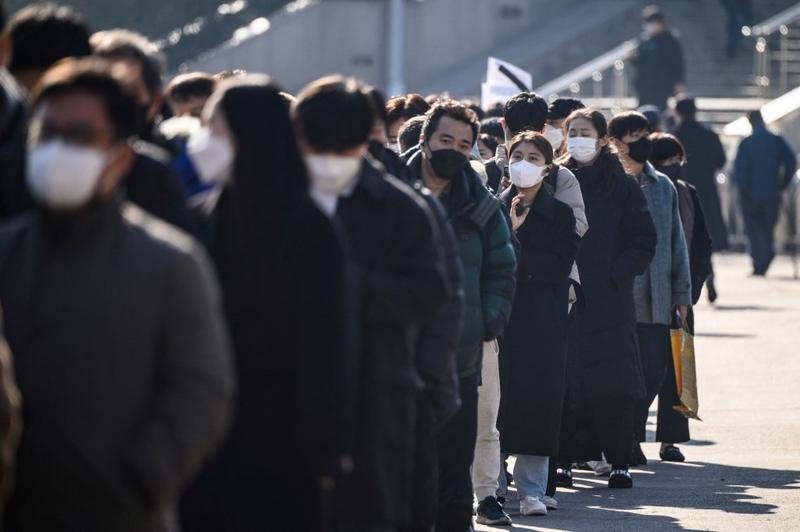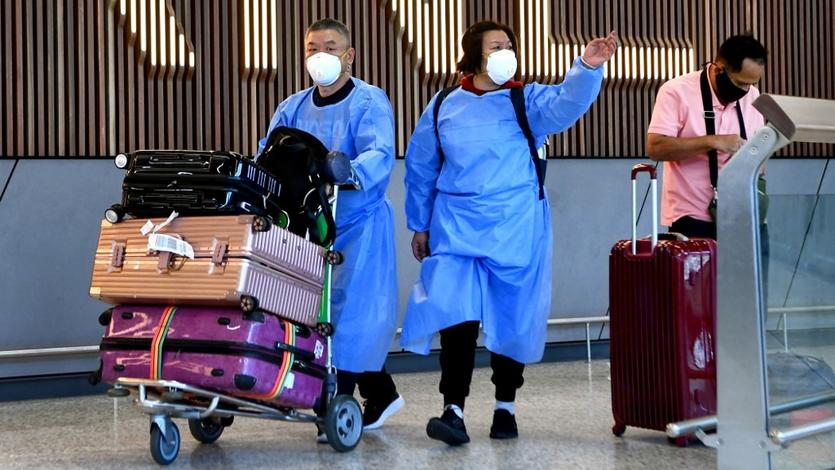 People queue for PCR (polymerase chain reaction) tests at a COVID-19 coronavirus testing centre in Seoul on Dec 8, 2021.
(ANTHONY WALLACE / AFP)
People queue for PCR (polymerase chain reaction) tests at a COVID-19 coronavirus testing centre in Seoul on Dec 8, 2021.
(ANTHONY WALLACE / AFP)
CANBERRA / JERUSALEM - South Korea reported a record number of critical patients on Sunday -- 894 -- as officials struggle with nearly 80 percent of intensive care hospital beds occupied. The Asian nation added 43 deaths, following a record 80 on the previous day, raising concerns in a country where more than 90 percent of adults are fully vaccinated.
Daily cases stood at 6,689, falling slightly from the previous day but still the highest level for a weekend, when fewer testings occur. Cases of the omicron variant rose by 15, to a total of 90. Officials have urged people over 60 to get a booster, as about 92 percent of deaths have come from that group.
Australia
Australia said on Sunday it will shorten the wait time for people to receive a COVID-19 booster following a rise in cases of the Omicron variant.
Australia had previously said it would offer the booster to everyone over 18 who had had their second dose of the vaccine six months earlier.
With rising cases of the Omicron variant, Health Minister Greg Hunt said the time interval will be shortened to five months after the second dose
But with rising cases of the Omicron variant, Health Minister Greg Hunt said the time interval will be shortened to five months after the second dose.
"A booster dose five or more months after the second dose will make sure that the protection from the primary course is even stronger and longer lasting and should help prevent spread of the virus," Hunt said in an emailed statement.
ALSO READ: Australia confirms community transmission of Omicron variant
"Data from Israel shows boosters supporting reductions in the rate of infection in eligible age groups, severe disease in those aged over 40 years and deaths in those over 60 years."
Australia will use both vaccines from Pfizer and Moderna in its booster program.
 International travelers wearing personal protective equipment (PPE) arrive at Melbourne's Tullamarine Airport on November 29, 2021. (WILLIAM WEST / AFP)
International travelers wearing personal protective equipment (PPE) arrive at Melbourne's Tullamarine Airport on November 29, 2021. (WILLIAM WEST / AFP)
Israel
Israeli researchers said on Saturday they found that a three-shot course of the Pfizer/BioNTech COVID-19 vaccine provided significant protection against the new Omicron variant.
The findings were similar to those presented by BioNTech and Pfizer earlier in the week, which were an early signal that booster shots could be key to protect against infection from the newly identified variant.
The study, carried out by Sheba Medical Center and the Health Ministry's Central Virology Laboratory, compared the blood of 20 people who had received two vaccine doses 5-6 months earlier to the same number of individuals who had received a booster a month before.
"People who received the second dose 5 or 6 months ago do not have any neutralization ability against the Omicron. While they do have some against the Delta (strain)," Gili Regev-Yochay, director of the Infectious Diseases Unit at Sheba, told reporters.
"The good news is that with the booster dose it increases about a hundred fold. There is a significant protection of the booster dose. It is lower than the neutralization ability against the Delta, about four times lower," she said.
The Israeli team said they worked with the actual virus while the companies used what is known as a pseudovirus, which was bio-engineered to have the hallmark mutations of Omicron.
The Israeli research follows a study from South Africa that found the Omicron variant can partially evade protection from two doses.
Japan
In Japan’s Gifu prefecture, a man traveling from Sri Lanka has tested positive for the Omicron variant, Japan’s health ministry announced. Though several Omicron infections have been detected via screenings at airports, the new case is Japan’s first to be confirmed in a person quarantining at home, according to the Asahi newspaper.
The case highlights the difficulty even a country implementing some of the most stringent border controls faces trying to contain the newly discovered variant. Last month, Japan moved to close its borders to new foreign arrivals and have its own citizens isolate on arrival from countries where the omicron variant has been found.
ALSO READ: Less than 1 COVID death a day in Japan as new cases plummet
The foreign national tested negative in initial screenings but came down with symptoms after returning to his home in Gifu last week, according to Japan’s health ministry.


